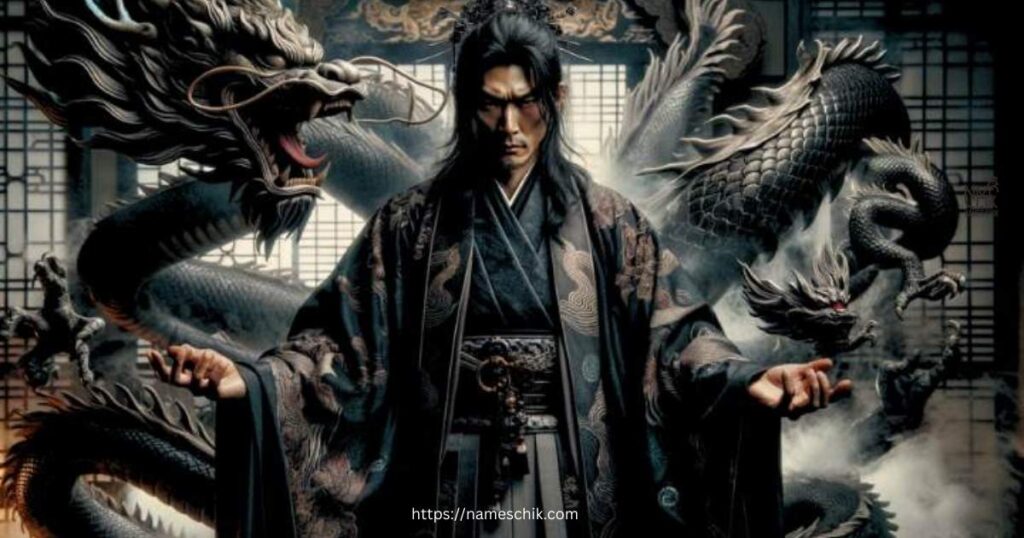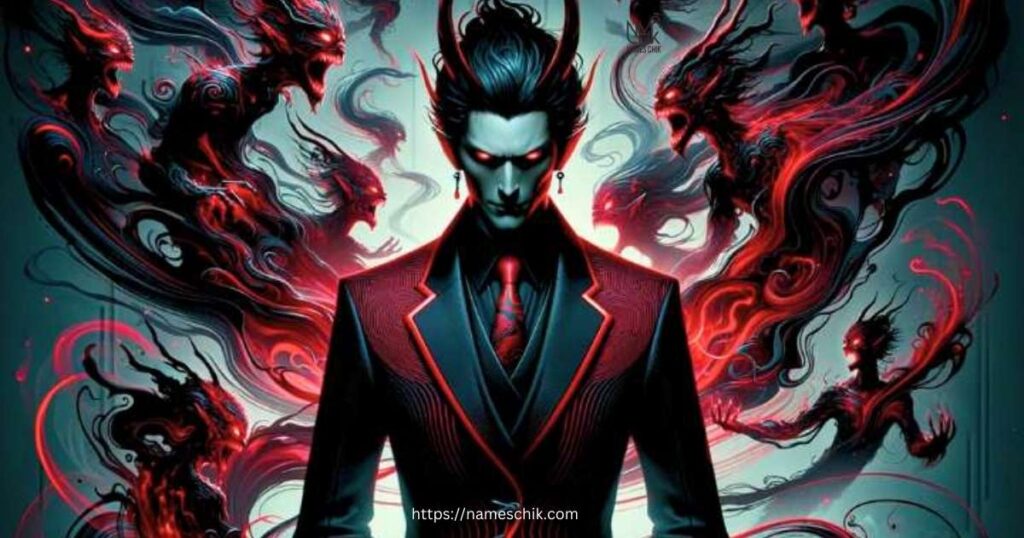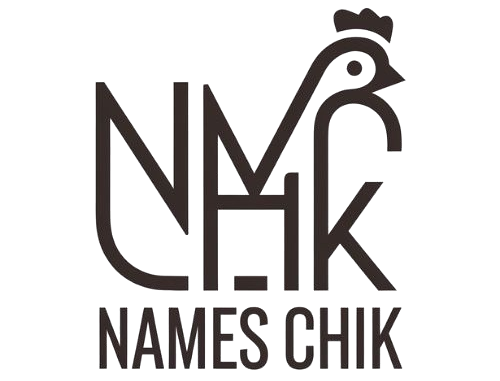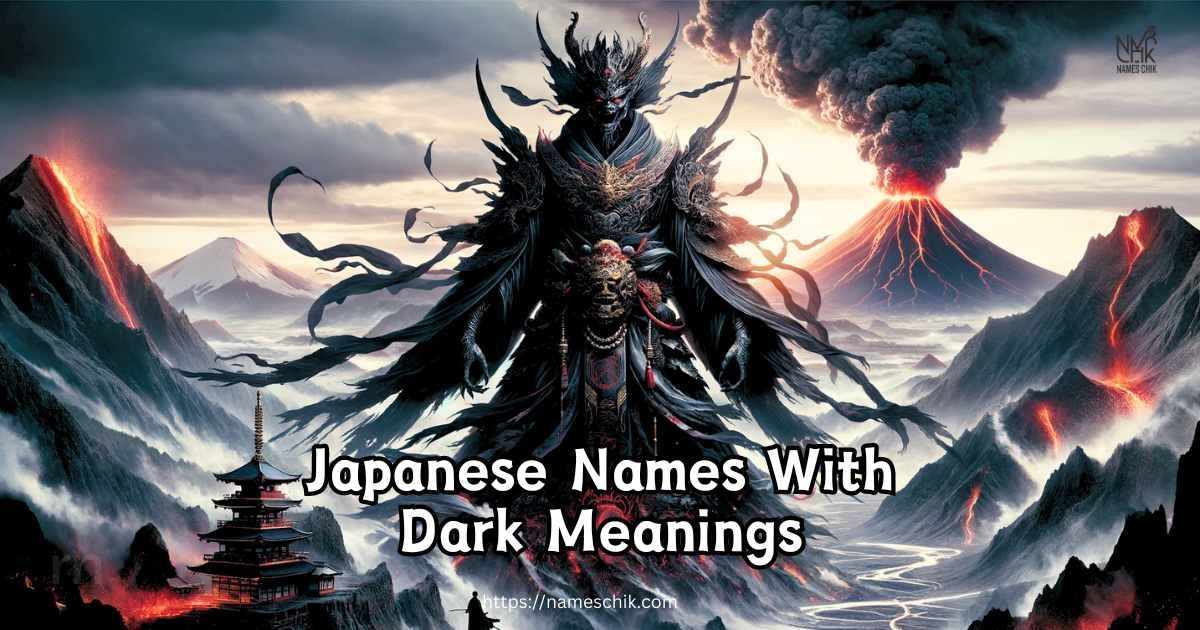Dark Japanese names are captivating, blending mystery, tradition, and supernatural allure. More than mere names, they open doors to Japan’s deep-rooted tales of sin, nightmares, and even dark angels. Rooted in ancient history and folklore, these names resonate with meanings that go far beyond the ordinary, connecting deeply with the spiritual and mystical sides of Japanese culture.
Names that symbolize dark angels or draw from Japanese mythology carry powerful stories and emotions, offering insights into Japan’s unique beliefs. From hints of the afterlife to symbols of demons and shadows, they reveal a hauntingly beautiful side of Japanese tradition. Each Dark Japanese name brings a piece of folklore to life, evoking an unforgettable impression that lingers long after it’s heard, capturing the imagination and embodying Japan’s most mysterious cultural depths.
Japanese Names Meaning Sin

- 罪 (Tsumi) – Represents the concept of sin or moral wrongdoing in Japanese culture.
- 邪 (Ja) – A name symbolizing dark, malicious energies and evil intentions.
- 悪 (Aku) – Reflects wickedness, often associated with dark Japanese names and evil.
- 怨 (On) – Represents vengeful thoughts or grudges, linked with Japanese folklore.
- 妖 (Yō) – Implies supernatural beings or spirits, fitting dark Japanese names perfectly.
- 魔 (Ma) – Meaning “demon,” tied to evil spirits in dark Japanese names.
- 災 (Wazawai) – Signifies disaster or misfortune, often found in dark Japanese names.
- 陰 (In) – Represents shadows or dark forces, deeply rooted in Japanese symbolism.
- 闇 (Yami) – Means “darkness,” a powerful element in dark Japanese names.
- 幽 (Yū) – Reflects ghostly or spiritual entities, common in Japanese supernatural tales.
- 罰 (Batsu) – Symbolizes punishment, fitting well in lists of dark Japanese names.
- 苦 (Ku) – Means “suffering,” often used in names reflecting sorrow or darkness.
- 怨霊 (Onryō) – A vengeful spirit, part of Japanese ghostly folklore and legends.
- 狂 (Kyō) – Represents madness or chaos, associated with dark Japanese names.
- 鬼 (Oni) – Depicts a demon or ogre, often tied to dark supernatural names.
- 死 (Shi) – Means “death,” an intense concept in dark Japanese name culture.
- 殺 (Satsu) – Represents killing, a harsh symbol in dark Japanese naming traditions.
- 亡 (Bō) – Symbolizes the deceased or death, often found in ominous names.
- 呪 (Noroi) – Means “curse,” a sinister theme common in dark Japanese names.
- 怖 (Kowai) – Signifies fear, adding to the eerie appeal of dark Japanese names.
- 闇夜 (Yamiyo) – Means “dark night,” suggesting hidden dangers in Japanese folklore.
- 狂気 (Kyōki) – Represents insanity, creating a chilling vibe in dark Japanese names.
- 悲 (Hi) – Means “sorrow,” capturing deep sadness in dark Japanese name choices.
Japanese Girl Names Meaning Dark
- 暗子 (Kurako) – Means “child of darkness,” a common choice in dark Japanese names.
- 夜美 (Yomi) – Reflects “night beauty,” often found in dark Japanese names for girls.
- 陰子 (Inkoko) – Signifies “child of shadow,” adding depth to dark Japanese names.
- 黒子 (Kuroko) – Means “black child,” symbolizing mystery and elegance in Japanese culture.
- 暗夜 (An’ya) – Represents “dark night,” ideal for mysterious, dark Japanese names.
- 夢闇 (Yumeyami) – Means “dark dreams,” combining mystery with beauty in Japanese naming.
- 幽花 (Yūka) – Reflects “ghostly flower,” a haunting yet delicate dark Japanese name.
- 鬼子 (Oniko) – Depicts “demon child,” adding edge to dark Japanese girl names.
- 闇子 (Yamiko) – Means “child of darkness,” fitting for ominous dark Japanese names.
- 黒夜 (Kuroya) – Means “black night,” creating an aura of elegance and mystery.
- 悲夢 (Himu) – Signifies “sad dream,” blending sorrow with beauty in Japanese names.
- 暗華 (Anka) – Means “dark flower,” combining grace with dark Japanese name themes.
- 幽美 (Yūmi) – Reflects “ghostly beauty,” ideal for names inspired by Japanese folklore.
- 鬼花 (Onika) – Means “demon flower,” adding a mystical touch to dark Japanese names.
- 悪美 (Akumi) – Means “evil beauty,” balancing allure with sinister themes in Japanese names.
- 闇華 (Yamika) – Signifies “dark blossom,” a hauntingly beautiful dark Japanese name.
- 黒海 (Kuroumi) – Means “black sea,” symbolizing depth and darkness in Japanese culture.
- 夢夜 (Yumeya) – Reflects “night dream,” capturing mystery in dark Japanese girl names.
- 悲子 (Hiko) – Means “child of sorrow,” emphasizing dark Japanese names’ emotional depth.
- 暗夢 (Anmu) – Means “dark dream,” weaving beauty and darkness in Japanese girl names.
Japanese Boy Names Meaning Dark
- 陰陽 (Inyō) – Means “shadow and light,” reflecting balance in darkness and brightness.
- 夜 (Yoru) – Simply means “night,” symbolizing mystery and the unknown.
- 暗 (Kurayami) – Represents “darkness,” an ideal choice for a mysterious boy’s name.
- 黒 (Kuro) – Means “black,” often associated with elegance and depth in Japanese culture.
- 影 (Kage) – Signifies “shadow,” capturing a sense of secrecy and intrigue.
- 鬼 (Oni) – Depicts a “demon,” linked to dark folklore and powerful legends.
- 幽 (Yū) – Means “ghostly,” suggesting a connection to the supernatural and ethereal.
- 闇 (Yami) – Represents “darkness,” embodying the essence of the night and mystery.
- 妖 (Yō) – Signifies “bewitching,” capturing the allure of the supernatural world.
- 悪 (Aku) – Means “evil,” reflecting darker themes and complex characters in stories.
- 災 (Wazawai) – Represents “disaster,” adding a sense of foreboding to a name.
- 亡 (Bō) – Means “deceased,” often linked to the afterlife and deep symbolism.
- 狂 (Kyō) – Signifies “madness,” suggesting a wild, untamed spirit in dark tales.
- 罰 (Batsu) – Means “punishment,” evoking themes of consequence and moral complexity.
- 暗影 (An’ei) – Means “dark shadow,” a poetic choice for a boy’s name.
- 鬼神 (Oni-gami) – Represents “demon god,” embodying strength and otherworldly power.
- 暗夜 (An’ya) – Means “dark night,” perfect for a boy with a mysterious aura.
- 煉獄 (Rengoku) – Signifies “purgatory,” associated with deep spiritual themes in names.
- 悪夢 (Akumu) – Means “bad dream,” a haunting choice with emotional depth.
- 幻 (Maboroshi) – Represents “illusion,” capturing the essence of mystery and enchantment.
Japanese Names Meaning Nightmare

- 悪夢 (Akumu) – Directly translates to “nightmare,” symbolizing fear and darkness.
- 悲夢 (Himu) – Means “sad dream,” capturing the essence of sorrowful visions.
- 幽夢 (Yūmu) – Signifies “ghostly dream,” evoking feelings of the supernatural.
- 恐夢 (Kyōmu) – Represents “fearful dream,” linked to anxiety and dread.
- 夢魘 (Muyaku) – Means “nightmare,” often associated with unsettling sleep experiences.
- 幻夢 (Genmu) – Signifies “phantom dream,” reflecting illusionary or surreal qualities.
- 悪夢子 (Akumiko) – Combines “nightmare” with “child,” symbolizing a darker essence.
- 恐ろしい夢 (Osoroshii Yume) – Means “terrifying dream,” reflecting deep fears and anxieties.
- 眠り鬼 (Nemuri Oni) – Translates to “sleeping demon,” linking nightmares to dark spirits.
- 鬼夢 (Onimu) – Combines “demon” with “dream,” emphasizing sinister night visions.
- 夢の闇 (Yume no Yami) – Means “darkness of dreams,” suggesting hidden fears.
- 惨夢 (Sanmu) – Represents “tragic dream,” capturing feelings of loss and despair.
- 幽霊夢 (Yūrei mu) – Means “ghost dream,” connecting nightmares with supernatural beings.
- 夢食 (Yume-shoku) – Translates to “dream eater,” symbolizing the consumption of nightmares.
- 鬼夜 (Oniya) – Means “demon night,” linking night terrors to dark folklore.
- 不安夢 (Fuan mu) – Represents “anxiety dream,” emphasizing feelings of distress.
- 夢の災 (Yume no Wazawai) – Means “disaster of dreams,” hinting at terrible visions.
- 恐怖の夢 (Kyōfu no Yume) – Means “dream of fear,” highlighting dread in dreams.
- 夢幻 (Mugen) – Signifies “dream illusion,” suggesting a surreal, nightmarish experience.
- 悲しみの夢 (Kanashimi no Yume) – Means “dream of sorrow,” evoking feelings of sadness.
- 悪夢の子 (Akumu no Ko) – Means “child of nightmares,” suggesting dark origins.
- 幽霊の悪夢 (Yūrei no Akumu) – Means “ghost’s nightmare,” linking spirits to dark dreams.
Japanese Names Meaning Evil
- 悪 (Aku) – Directly means “evil,” a powerful choice for evil japanese names.
- 邪 (Ja) – Signifies “wickedness,” often associated with malevolent spirits.
- 妖 (Yō) – Means “bewitching” or “evil,” reflecting supernatural allure.
- 惡 (Warui) – Another term for “evil,” capturing a sense of moral wrongdoing.
- 罪 (Tsumi) – Means “sin,” linking actions to negative consequences.
- 邪悪 (Jaaku) – Combines “evil” and “wickedness,” emphasizing malicious intent.
- 凶 (Kyō) – Represents “ominous” or “evil,” often linked to misfortune.
- 陰 (In) – Signifies “shadow,” associated with darkness and evil deeds.
- 恶魔 (Akuma) – Means “devil” or “demon,” a strong symbol of evil.
- 魔 (Ma) – Represents “evil spirit” or “demon,” embodying darkness.
- 悪鬼 (Akuki) – Means “evil demon,” emphasizing a fierce presence.
- 鬼 (Oni) – Represents a “demon,” linked to malevolent folklore.
- 不幸 (Fukō) – Means “misfortune,” suggesting the consequences of evil actions.
- 鬼神 (Oni-gami) – Means “demon god,” embodying both power and evil.
- 悪女 (Akajo) – Translates to “evil woman,” often seen in dark tales.
- 凶悪 (Kyōaku) – Means “heinous” or “atrocious,” linked to extreme evil.
- 邪神 (Jashin) – Represents “evil god,” often found in darker mythologies.
- 邪教 (Jakyō) – Means “evil cult,” suggesting sinister beliefs and practices.
- 呪 (Noroi) – Means “curse,” highlighting the malevolent side of names.
- 惡意 (Akui) – Means “evil intention,” emphasizing darker motivations.
- 霊悪 (Reiaku) – Means “evil spirit,” suggesting a supernatural connection.
- 妖艶 (Yōen) – Signifies “bewitching evil,” blending beauty with darkness.
Read More: Famous Pet Names for Monkey
Japanese Names Meaning Dark Angel
- 闇の天使 (Yami no Tenshi) – Means “angel of darkness、” reflecting duality in nature.
- 黒天使 (Kuro Tenshi) – Translates to “black angel,” symbolizing mystery and elegance.
- 影天使 (Kage Tenshi) – Means “shadow angel,” emphasizing a hidden presence.
- 妖天使 (Yō Tenshi) – Represents “bewitching angel,” linking beauty to darkness.
- 暗天使 (An Tenshi) – Means “dark angel,” a powerful name with depth.
- 黒き翼 (Kuroki Tsubasa) – Translates to “black wings,” symbolizing freedom in darkness.
- 鬼天使 (Oni Tenshi) – Means “demon angel,” suggesting a fierce protector.
- 罪の天使 (Tsumi no Tenshi) – Means “angel of sin,” embodying moral complexity.
- 夜の天使 (Yoru no Tenshi) – Means “angel of the night,” evoking a sense of mystery.
- 幽霊天使 (Yūrei Tenshi) – Represents “ghost angel,” linking to the spiritual realm.
- 幻天使 (Maboroshi Tenshi) – Means “phantom angel,” emphasizing the ethereal quality.
- 闇使者 (Yami Shisha) – Means “messenger of darkness,” a unique angelic representation.
- 魅惑の天使 (Miwaku no Tenshi) – Means “bewitching angel,” blending beauty with darkness.
- 霊天使 (Rei Tenshi) – Represents “spirit angel,” emphasizing a supernatural essence.
- 邪天使 (Ja Tenshi) – Means “evil angel,” embodying darker themes in names.
- 深い闇の天使 (Fukai Yami no Tenshi) – Means “angel of deep darkness,” emphasizing mystery.
- 夜空の天使 (Yozora no Tenshi) – Means “angel of the night sky,” linking to beauty.
- 黒い羽 (Kuroi Hane) – Means “black feather,” symbolizing a connection to dark angels.
- 忍びの天使 (Shinobi no Tenshi) – Means “stealthy angel,” suggesting a hidden guardian.
- 闇の守護者 (Yami no Shugo-sha) – Means “guardian of darkness,” reflecting strength and protection.
- 邪魅の天使 (Jami no Tenshi) – Means “angel of dark charm,” blending allure with shadows.
- 無垢な闇の天使 (Muku na Yami no Tenshi) – Means “innocent dark angel,” a unique contrast.
Japanese Last Names Meaning Dark
- 黒川 (Kurokawa) – Means “black river,” symbolizing depth and mystery.
- 闇田 (Yamida) – Means “dark rice field,” evoking imagery of hidden beauty.
- 影山 (Kageyama) – Signifies “shadow mountain,” representing strength and mystery.
- 陰村 (Inmura) – Means “shadow village,” suggesting a hidden or mysterious place.
- 暗井 (Kurai) – Means “dark well,” evoking a sense of depth and intrigue.
- 黒木 (Kuroki) – Translates to “black tree,” symbolizing resilience in darkness.
- 影浦 (Kageura) – Means “shadow bay,” reflecting tranquility and hidden depths.
- 幽谷 (Yūdani) – Signifies “ghost valley,” linking to supernatural themes.
- 霊川 (Reikawa) – Means “spirit river,” suggesting a connection to the otherworldly.
- 影橋 (Kagehashi) – Means “shadow bridge,” representing transitions between realms.
- 煉獄田 (Rengokuda) – Means “purgatory rice field,” evoking deep spiritual themes.
- 黒羽 (Kurohane) – Means “black feather,” linking to darkness and flight.
- 邪井 (Jai) – Signifies “evil well,” suggesting a sense of foreboding.
- 夜山 (Yoriyama) – Means “night mountain,” evoking images of dark heights.
- 幽霊沢 (Yūreizawa) – Means “ghost swamp、” symbolizing hidden depths and mystery.
- 影川 (Kagegawa) – Means “shadow river,” suggesting fluidity in darkness.
- 暗谷 (Kuradani) – Means “dark valley,” representing hidden beauty and depth.
- 幻村 (Maboroshi-mura) – Means “illusion village,” capturing mystery and allure.
- 霧山 (Kiriyama) – Means “fog mountain,” suggesting obscurity and mystery.
- 幽海 (Yūmi) – Means “ghost sea,” linking to vast, hidden depths.
- 鬼塚 (Onizuka) – Means “demon mound,” embodying folklore and dark themes.
- 影野 (Kageno) – Means “shadow field,” evoking tranquility and hidden beauty.
Japanese Names Inspired by Shadows
- 影響 (Eikyō) – Means “influence,” often connected to the unseen power of shadows.
- 影武者 (Kagemusha) – Means “shadow warrior,” representing a hidden protector in battle.
- 影忍 (Kagenin) – Refers to “shadow ninja,” symbolizing stealth and secrecy.
- 影絵 (Kagee) – Means “shadow picture,” capturing the art of silhouettes and darkness.
- 影像 (Eizō) – Translates to “shadow image,” suggesting the duality of light and dark.
- 影の森 (Kage no Mori) – Means “forest of shadows,” evoking a mysterious, enchanting place.
- 影響力 (Eikyōryoku) – Means “influence power,” highlighting the subtle force of shadows.
- 影道 (Kagedō) – Means “shadow path,” suggesting a hidden route or journey.
- 影光 (Kagehikari) – Means “shadow light,” representing the interplay between light and dark.
- 影響力者 (Eikyōryokusha) – Refers to “influencer,” emphasizing those who operate in shadows.
- 影の舞 (Kage no Mai) – Means “dance of shadows,” symbolizing elegance and mystery.
- 影を追う (Kage o Ou) – Means “to chase shadows,” representing the pursuit of hidden truths.
- 影の音 (Kage no Oto) – Means “sound of shadows,” capturing whispers and secrets.
- 影の巣 (Kage no Su) – Means “nest of shadows,” symbolizing a hiding place for secrets.
- 影の精霊 (Kage no Seirei) – Means “spirit of shadows,” linking to supernatural beliefs.
- 影の心 (Kage no Kokoro) – Means “heart of shadows,” suggesting deep emotional layers.
- 影の夢 (Kage no Yume) – Means “dream of shadows,” evoking mystery and the subconscious.
- 影の島 (Kage no Shima) – Means “island of shadows、” suggesting isolation and enigma.
- 影の道 (Kage no Michi) – Means “path of shadows,” representing a journey through darkness.
- 影の風 (Kage no Kaze) – Means “wind of shadows、” symbolizing change and mystery.
- 影の涙 (Kage no Namida) – Means “tears of shadows,” reflecting sorrow and hidden emotions.
- 影の花 (Kage no Hana) – Means “flower of shadows,” representing beauty found in darkness.
FAQ’s
Can Japanese names with dark meanings be considered offensive?
While some may find dark meanings unsettling, most names are not inherently offensive. Context and intent matter in how names are perceived.
Are there any alternative spellings or variations for Japanese names with dark meanings?
Dark Japanese Names often have different romanizations or kanji options. Exploring these variations can enhance your character’s uniqueness.
Do Japanese names with dark meanings have a negative connotation?
Dark meanings can imply mystery or depth, but they don’t always carry negativity. Interpretation often depends on cultural and personal perspectives.
Are Japanese names with dark meanings commonly used in Japan?
Some Dark Japanese Names are used, but they are not mainstream. Many parents prefer names with positive or neutral meanings for their children.
How can I ensure I am pronouncing a Japanese name with a dark meaning correctly?
Listening to native speakers or using pronunciation guides is helpful for Dark Japanese Names. This ensures you capture the correct sounds and tones.
Conclusion
Dark Japanese Names offer a captivating glimpse into Japan’s rich cultural heritage. These names often carry deep meanings, connecting to themes of sin, nightmares, and the supernatural. They invite you to explore the intriguing aspects of Japanese folklore and tradition. Whether you use them in storytelling or character creation, Dark Japanese Names add layers of emotion and complexity.
Exploring these names deepens your understanding of cultural symbolism and the narratives behind them. With each name, you uncover stories filled with mystery and depth. Embracing Dark Japanese Names can enhance your creative projects and spark fascinating discussions about their origins. Overall, these names reflect the beauty found in darkness, making them unforgettable and meaningful choices for anyone looking to infuse their work with unique cultural elements.

